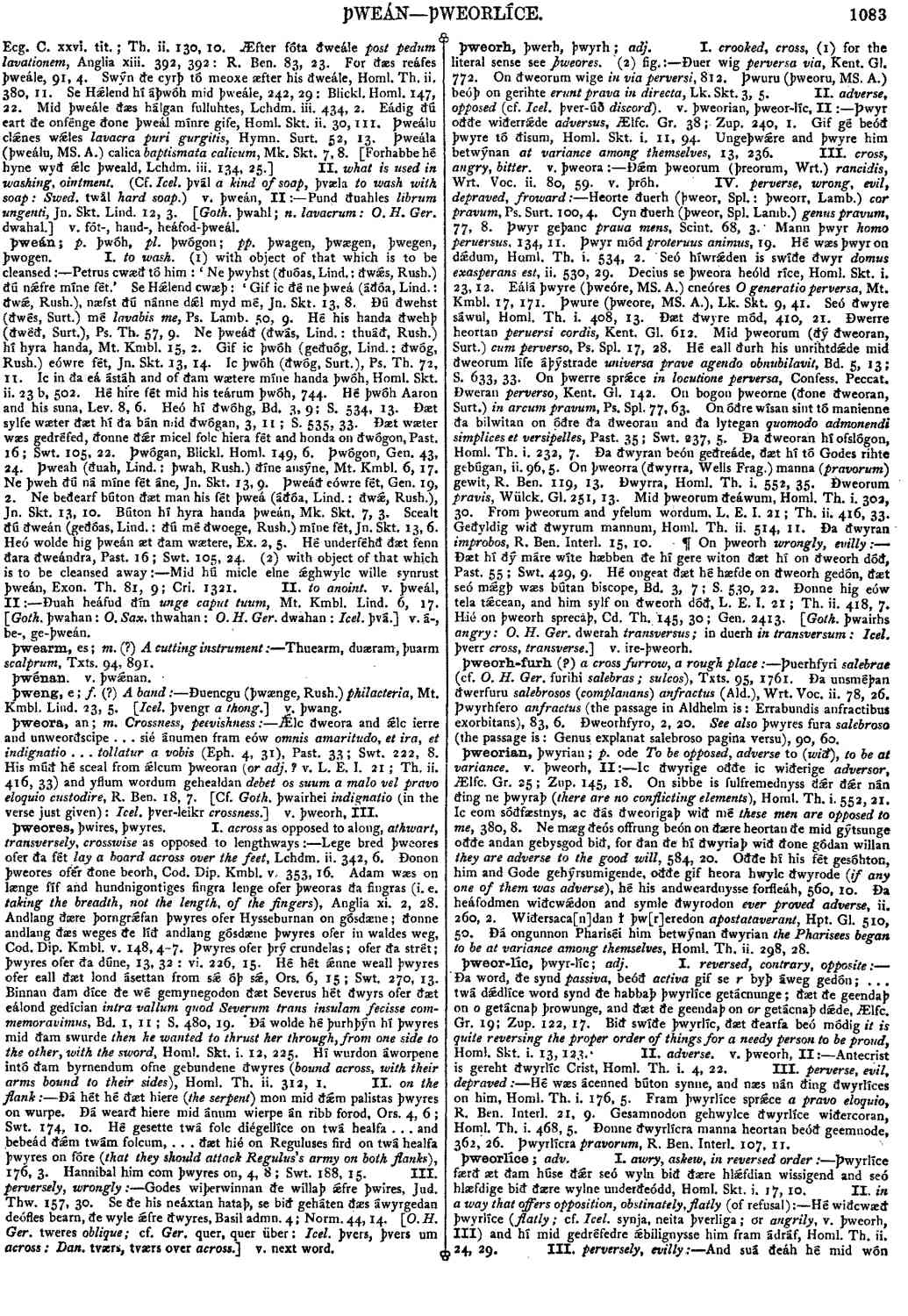þweán
- verb [ strongcontracted ]
-
Petrus cwæð tó him: 'Ne þwyhst (ðuóas, Lind.: ðwǽs, Rush.) ðú nǽfre míne fét.' Se Hǽlend cwæþ: ' Gif ic ðé ne þweá (áðóa, Lind.: ðwǽ, Rush.), næfst ðú nánne dǽl myd mé,
- Jn. Skt. 13, 8.
-
Ðú ðwehst (ðwés, Surt.) mé
lavabis me,
- Ps. Lamb. 50, 9.
-
Hé his handa ðwehþ (ðwéð, Surt.),
- Ps. Th. 57. 9.
-
Ne þweáð (ðwés, Lind.: thuáð, Rush.) hí hyra handa,
- Mt. Kmbl. 15, 2.
-
Gif ic þwóh (geðuóg, Lind.: ðwóg, Rush.) eówre fét,
- Jn. Skt. 13, 14.
-
Ic þwóh (ðwóg, Surt.),
- Ps. Th. 72, 11.
-
Ic in ða eá ástáh and of ðam wætere míne handa þwóh,
- Homl. Skt. ii. 23 b, 502.
-
Hé hire fét mid his teárum þwóh,
- 744.
-
Hé þwóh Aaron and his suna,
- Lev. 8, 6.
-
Heó hí ðwóhg,
- Bd. 3, 9 ;
- S. 534, 13.
-
Ðæt sylfe wæter ðæt hí ða bán mid ðwógan,
- 3, 11 ;
- S. 535, 33.
-
Ðæt wæter wæs gedréfed, ðonne ðǽr micel folc hiera fét and honda on ðwógon,
- Past. 16 ;
- Swt. 105, 22.
-
Þwógan,
- Blickl. Homl. 149, 6.
-
Þwógon,
- Gen. 43, 24.
-
Þweah (ðuah, Lind.: þwah, Rush.) ðíne ansýne,
- Mt. Kmbl. 6, 17.
-
Ne þweh ðú ná míne fét áne,
- Jn. Skt. 13, 9.
-
Þweáð eówre fét,
- Gen. 19, 2.
-
Ne beðearf búton ðæt man his fét þweá (áðóa, Lind.: ðwǽ, Rush.),
- Jn. Skt. 13, 10.
-
Búton hí hyra handa þweán,
- Mk. Skt. 7, 3.
-
Scealt ðú ðweán (geðóas, Lind.: ðú mé ðwoege, Rush.) míne fét,
- Jn. Skt. 13, 6.
-
Heó wolde hig þweán æt ðam wætere,
- Ex. 2, 5.
-
Hé underféhð ðæt fenn ðara ðweándra,
- Past. 16 ;
- Swt. 105, 24.
-
Mid hú micle elne ǽghwylc wille synrust þweán,
- Exon. Th. 81, 9 ;
- Cri. 1321.
-
Ðuah heáfud ðín
unge caput tuum,
- Mt. Kmbl. Lind. 6, 17.
Bosworth, Joseph. “þweán.” In An Anglo-Saxon Dictionary Online, edited by Thomas Northcote Toller, Christ Sean, and Ondřej Tichy. Prague: Faculty of Arts, Charles University, 2014. https://bosworthtoller.com/32365.
Checked: 1